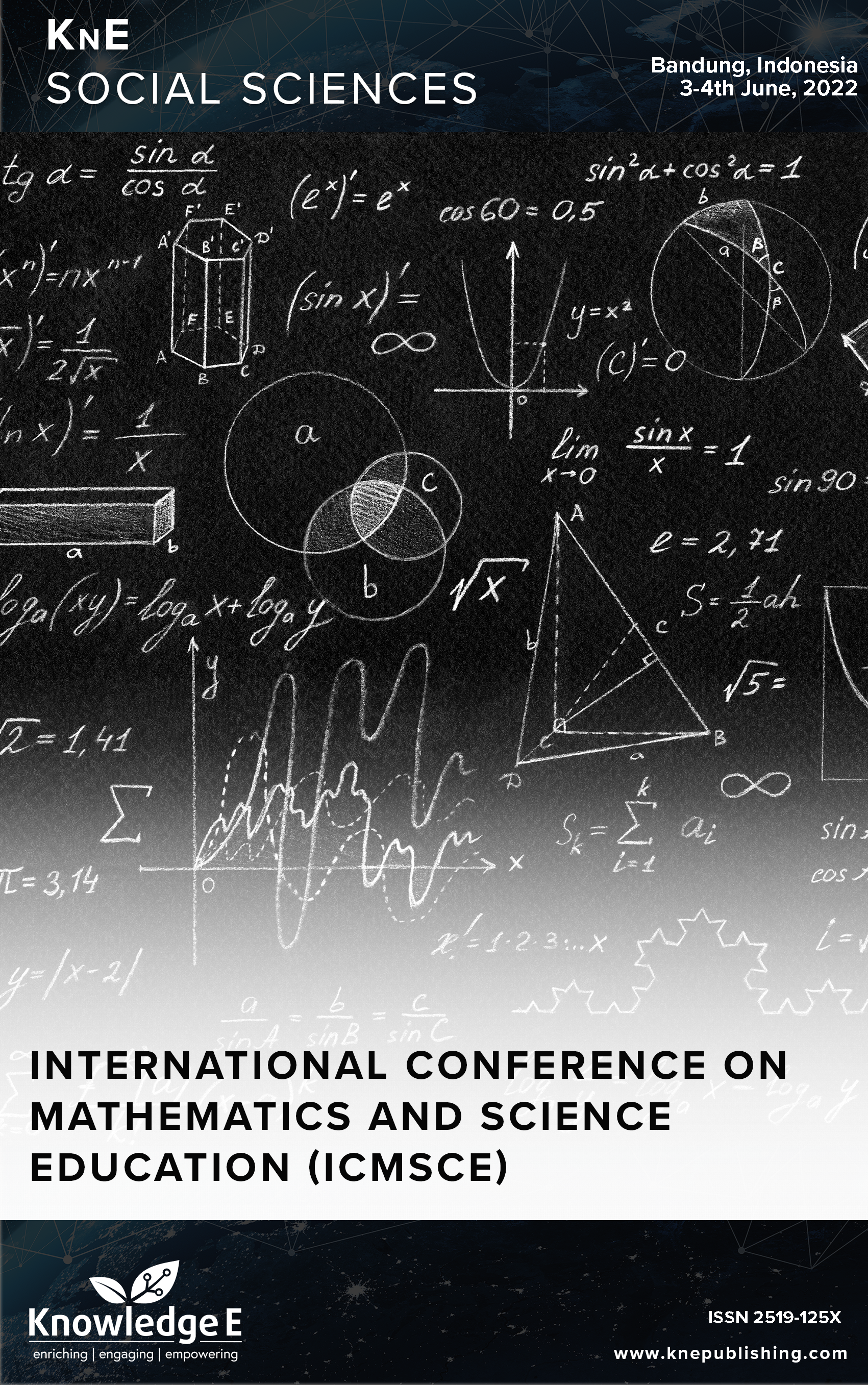Students' Perspectives on Selecta Capita of Mathematics Online Course on Their Ability to Develop Mathematics Task
DOI:
https://doi.org/10.18502/kss.v9i8.15576Abstract
The main problem in implementing online lectures is how to adjust what students expect with the achievement of learning quality. This study examines students’ perspectives on effective lectures on the ability to develop mathematics task. Quantitative descriptive research has been carried out on students of the mathematics education study program Universitas Negeri Semarang who took the Selecta Capita of Mathematics course. The subjects in this study were 101 first-year students in the mathematics education study program at Semarang State University for the 2021/2022 academic year. The data were obtained through questionnaires and analyzed by the descriptive statistics. The data that had been obtained and then tabulated in a table, the average value is searched, and presented in the appropriate graph. The results of the study indicate that the availability of learning modules and videos as learning resources is the most important thing that must be prepared during lectures. Furthermore, several other things such as synchronous lectures, discussions using the WhatsApp Group, the use of the learning management system, group assignments, virtual face-to-face meetings, and project assignments need to be prepared during lectures. These results are needed to be applied on team-based project learning models to develop students’ abilities in developing math tasks.
Keywords: students’ perspectives, selecta capita, mathematics online course, mathematics task
References
Turmuzi M, Wahidaturrahmi W. Analisis kompetensi profesional dan pedagogik mahasiswa pendidikan matematika dalam implementasi kurikulum 2013. Jurnal Ilmu Pendidikan. 2021;3(2):341–54. DOI: https://doi.org/10.31004/edukatif.v3i2.301
Sukmawati R. Analisis kesiapan mahasiswa menjadi calon guru profesional berdasarkan standar kompetensi pendidik. J Anal. 2019;5(1):95–102. DOI: https://doi.org/10.15575/ja.v5i1.4789
Weng X, Cui Z, Ng OL, Jong MS, Chiu TK. Characterizing students’ 4C skills development during problem-based digital making. J Sci Educ Technol. 2022;31(3):372–85. DOI: https://doi.org/10.1007/s10956-022-09961-4
Hecklau F, Galeitzke M, Flachs S, Kohl H. Holistic approach for human resource management in industry 4.0. Procedia CIRP. 2016;54:1–6. DOI: https://doi.org/10.1016/j.procir.2016.05.102
Malik A. Creating competitive advantage through source basic capital strategic humanity in the industrial age 4.0. International Research Journal of Advanced Engineering and Science. 2019;4(1):209–15.
Benešová A, Tupa J. Requirements for education and qualification of people in industry 4.0. Procedia Manuf. 2017;11:2195–202. DOI: https://doi.org/10.1016/j.promfg.2017.07.366
Rahmawati R, Lestari F, Umam R. Analysis of the effectiveness of learning in the use of learning modules against student learning outcomes. J Math. 2019;2(3):233–40. DOI: https://doi.org/10.24042/djm.v2i3.4557
Mulyadi R, Syahrul R, Atmazaki, Agustina. Syahrul, Atmazaki, and Agustina, “The development of e-modules based on adobe flash for Indonesian subjects at IAIN Bukittinggi.,”. J Phys Conf Ser. 2020;1471(1):012002. DOI: https://doi.org/10.1088/1742-6596/1471/1/012002
Laugerman MR, Saunders KP. Supporting student learning through instructional videos in business statistics. Decis Sci J Innovative Educ. 2019;17(4):387–404. DOI: https://doi.org/10.1111/dsji.12193
Luna-Lucero M, O’Donnell Oppenzato C, Uscianowski C, Almeda MV, Ginsburg HP. ‘Magic math minute’ videos to foster understanding of early mathematics learning. Int J Des Learn. 2020;11(3):47–66. DOI: https://doi.org/10.14434/ijdl.v11i3.27128
Suchyadi Y, Safitri N, Sunardi O. “The use of multimedia as an effort to improve elementary teacher education study program college students comprehension ability and creative thinking skills in following science study courses.,” JHSS (Journal Of Humanities and Social Studies. vol. 4, no. 2, pp. 201–205, 2020. https://doi.org/10.33751/jhss.v4i2.2549. DOI: https://doi.org/10.33751/jhss.v4i2.2549
Kooloos JG, Klaassen T, Vereijken M, Van Kuppeveld S, Bolhuis S, Vorstenbosch M. Collaborative group work: effects of group size and assignment structure on learning gain, student satisfaction and perceived participation. Med Teach. 2011;33(12):983–8. DOI: https://doi.org/10.3109/0142159X.2011.588733
Ngereja B, Hussein B, Andersen B. Does project-based learning (PBL) promote student learning? A performance evaluation. Educ Sci (Basel). 2020;10(11):330. DOI: https://doi.org/10.3390/educsci10110330
Shin MH. Effects of project-based learning on students’ motivation and self-efficacy. Engl Teach. 2018;73(1):95–114. DOI: https://doi.org/10.15858/engtea.73.1.201803.95
M.M. Grant, “Learning, beliefs, and products: Students’ perspectives with projectbased learning,.” Interdisciplinary Journal of Problem-Based Learning. vol. 5, no. 2, p. 2011. https://doi.org/10.7771/1541-5015.1254. DOI: https://doi.org/10.7771/1541-5015.1254
Lee HJ, Lim C. Peer evaluation in blended team project-based learning: what do students find important? J Educ Technol Soc. 2012;15(4):214–24.
Direktorat Jenderal Pendidikan Tinggi. Buku panduan merdeka belajar - kampus merdeka. Jakarta: Direktorat Jenderal Pendidikan Tinggi Kemdikbud RI; 2020.
Hartini S, Dewantara D, Mahtari S. Pengembangan alat peraga fisika energi melalui perkuliahan berbasis project based learning. Vidya Karya. 2018;33(1):42. DOI: https://doi.org/10.20527/jvk.v33i1.5393
Umam HI, Jiddiyyah SH. Pengaruh pembelajaran berbasis proyek terhadap keterampilan berpikir kreatif ilmiah sebagai salah satu keterampilan abad 21. Jurnal Basicedu. 2021;5(1):350–6. DOI: https://doi.org/10.31004/basicedu.v5i1.645

